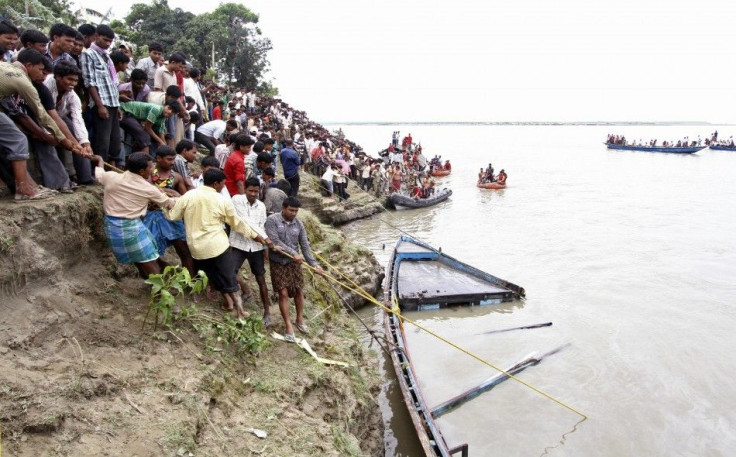India Ferry Sinking: Desperate Search For Survivors As Death Toll Mounts

Divers and army personnel are searching for survivors in a remote area of Assam following one of the worst ferry disasters in India's history.
Rescue workers on Tuesday searched the Brahmaputra River for the bodies of about 100 people who remain missing after an overcrowded ferry carrying 300 passengers broke apart and sank in the river during a torrential rainstorm accompanied by high winds. The ferry capsized on Monday, killing at least 103 people. Authorities said about 150 passengers had been rescued or swam to safety.
The sinking occurred near Fakiragram village in west Dhubri district, about 215 miles west of the state capital, Gauhati, not far from the Bangladesh border.
“The death toll may rise… and the exact toll will be known after the search operation,” Dhubri Deputy Commissioner Kumud Chandra Kalita said, according to the Press Trust of India (PTI).
Bad weather in the area continued to hamper overnight search and rescue efforts. A police officer told Reuters the ferry didn't have any lifeboats or life-jackets and it was so crowded that some passengers sat on the roof.
Indian Prime Minister Manmohan Singh said he was shocked and grieved by the incident, adding, he has given instructions for all possible assistance to the government of Assam in relief operations.”
The chief minister of Assam, Tarun Gogoi, has ordered an investigation into the sinking.
I will be ordering an inquiry into the cause of the accident, but right now our priority is to account for every person who was on the ferry, Gogoi said.
Overcrowded vessels and poor safety regulations are commonplace on the Indian subcontinent. At least 79 Muslim pilgrims died in October when an overcrowded boat sank in West Bengal, and in March about 138 people were killed when an overloaded ferry sank in neighboring Bangladesh.
The northeastern part of India has very poor road and rail connectivity and water transport is the way to travel for many people, said Birendra Prasad Baishya, a member of parliament from Assam, in the Washington Post. Improvement in the condition of boats, strict enforcement of rules about the number of passengers on a boat, and setting up of an early storm-warning system is the call of the hour.
© Copyright IBTimes 2024. All rights reserved.











